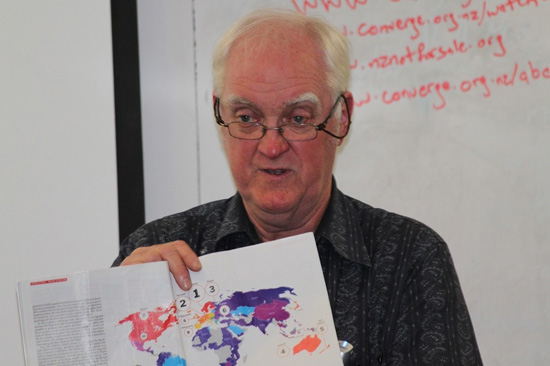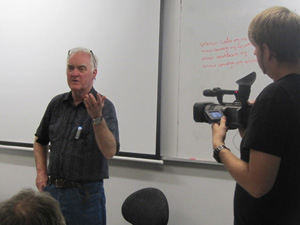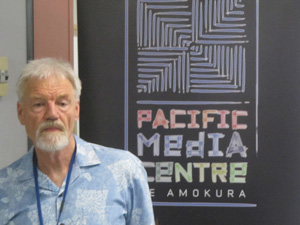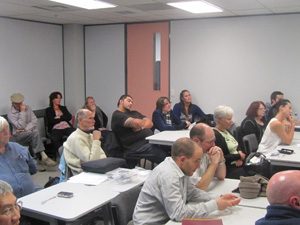
New Zealand is at risk from the “disease” of transnational corporations and New Zealanders need to unite in a formidable force of people power to defeat it, says advocate Murray Horton.
Speaking at the opening of his “New Zealand is NOT for sale” national tour at AUT University's Pacific Media Centre last night, Horton equated the privatisation of state assets and trade agreements that favour transnational corporations with a disease.
“We’re all dealing with the symptoms of the same disease, and it’s the diseases we need to tackle”, said Horton, organiser of the Campaign Against Foreign Control of Aotearoa (CAFCA).
A long-time activist and writer, Horton’s public seminar harshly criticised the New Zealand government for on-going attempts to privatise state assets and other assets by foreign transnational corporations in what he called “disadvantageous ‘free’ trade and foreign investment agreements”.
His main issue was the Trans-Pacific Partnership Agreement – a multilateral agreement on trade between New Zealand and the United States, which Horton says is currently being negotiated in secret.
“[The TPPA is] fundamentally undemocratic in the way in which it is being negotiated”, says Horton. “MPs will not get a vote on the TPPA, not until after it has already been signed, anyway”. Horton warned that many trade agreements worked to usurp the power governments had to limit foreign ownership or investment in their country.
Horton warned that many trade agreements worked to usurp the power governments had to limit foreign ownership or investment in their country.
“These agreements…are only superficially about trade, ‘free’ or otherwise. They all come with an accompanying foreign investment agreement which is quite often more important than the trade component,” he said.
'Investor rights'
Horton told the packed seminar room that among other dangers, the TPPA included a provision for “investor rights”.
This meant that companies from the signatory countries could sue the governments of other countries if the companies felt that they had been disadvantaged in their ability to function within that country in any way.
He cited as an example proposed changes to the liquor laws that target RTDs - the alcopops aimed at young drinkers.
Despite the negative social issues that are associated with youth and binge drinking, provisions in already signed trade agreements would limit New Zealand’s ability to make changes to its own liquor laws.
Horton said that by targeting one type of alcohol over another, New Zealand would be in breach of its obligations under trade agreements signed with Australia and the World Trade Organisation.
He said that the same issues applied when it came to other industries, such as tobacco and pharmaceuticals, and that the emphasis on “investor rights” over the welfare of the people, combined with increasing foreign investment and ownership in state assets was not ideal. Horton said that ownership was power and cited Prime Minister John Key as recognising this yet failing to act in the best interests of maintaining power.
Horton said that ownership was power and cited Prime Minister John Key as recognising this yet failing to act in the best interests of maintaining power.
“John Key has said that he doesn’t want New Zealanders to become tenants in their own country. Well he is doing his best to bring that about,” said Horton.
Past campaigns
An eclectic audience turned up to hear Horton speak, and many were keen to get the stalwart activist’s opinion on issues close to their heart.
Asked by one audience member about accusations of racism that had dogged past campaigns to do with opposing foreign ownership bids from non-English speaking countries, Horton joked: “We [CAFCA] are equal opportunity haters, we hate all foreigners”.
He added that the main culprits in New Zealand were American and Australian transnationals. Having mentioned this point earlier in his address, Horton reaffirmed that his argument was not against the people of any country - only their governments and transnational corporations.
Having mentioned this point earlier in his address, Horton reaffirmed that his argument was not against the people of any country - only their governments and transnational corporations.
He stressed that, for CAFCA, immigration was not the issue
Horton spoke as a call to arms for New Zealanders to educate themselves about the TPPA and issues to do with foreign ownership in their country.
He championed the cause, saying “we’re confronting the most powerful institutions in the country and in the world, but we’ve beaten them before and we’ll beat them again… we have nothing to hide and truth is on our side. We are many and they are few.”
Warners Bros takes out Roger award for 'worst transnational' in NZ



